(An Autonomous Institution)
Institutional Best Practices
1) Learning beyond Classrooms – Skill Development through Value Added Programs & Employment Enhancement Courses
2) International and National Level Student Internship - Continous Professional Development
Learning beyond Classrooms – Skill Development through Value Added Programs & Employment Enhancement Courses
To create learning environments that are inclusive, diverse and engage all types of learners, students are provided with learning opportunities that extend beyond the classroom. This is key to supporting and enhancing the learner experience and achieving positive educational outcomes for students. Emerging trends in technical and professional education call for value addition i.e., students must acquire something more than what is provided in the curriculum. SRIT has always strived to keep pace with the emerging trends in higher education. Keeping up with this ethos, SRIT constantly introduces programs that allow students to specialize in credentials in their chosen field along with the graduate programs.
The Context
Our institution is keen on helping the students take up certificate courses to complement their knowledge and skills related to their field of study. We offer a wide variety of short term certificate courses which are conducted after class hours or during semester breaks. These courses are conducted by professionals and industry experts and help students stand apart from the rest in the job market by adding further value to their resume. Besides, there is need to enhance their communication skills, to develop professional ethics in them and help them learn and develop human values and concern for humanity.
Achieving good placement records for its enrolled students is an important performance metric for an Educational Institution offering professional courses. Sri Ramakrishna Institute of Technology aims to impart and enrich employability skills of students through a systematic and consistent Value-added skill development programme that runs in parallel with the regular academic curriculum.
As per the information sourced from The Economic Times, the Information Technology / Software Service sector and Banking are top two recruiting sectors in India, together absorbing about 31 lakh graduates in their payrolls in the year 2021. Of these, 26 lakh graduates are recruited by the Software Sector alone. This motivated us to take under consideration, the expectations of Software Industries from their new incumbents, in our mentoring process. We researched through various inputs and identified important skill sets that a graduate must exhibit, in addition to their core engineering skills so as to qualify themselves for taking up entry level job positions in these sectors.
Objectives of the Practice
- To provide more engaging and relevant learning.
- To enable students to build specialised job oriented skills in their chosen area of study.
- To develop a student’s digital, collaborative and independent learning.
- To provide greater opportunities for revision, feedback and informal learning.
- To enhance capacity for inclusive and individualised learning.
- To ensure that each course has a clearly defined course objective and course outcome.
The Practice
From academic year 2017-2018, Sri Ramakrishna Institute of Technology formulates a detailed value-added skill development programme that spans over the entire duration of the degree programmes. These skill development programmes will run in parallel with the regular academic curriculum and enriches the employability traits of the students as they progress towards their graduation. A template of such a plan is described in the following section. This plan is refined over the years based on the experience gained in the execution of the plan and the outcomes achieved. The plan is common to all the students irrespective of their stream of engineering degree programme. To encourage the active participation of students in the various training course, academic credit points are being awarded for the completion of courses under the programme.
| S. No. | Semester | Skill Development Training |
| 1 | 1 | Orientation Programme with courses on Universal Human Values, Yoga and Life Skills. |
| 2 | 2 - 5 | Language Course that culminates with Business English Certification by Cambridge University. |
| 3 | 3-6 | Employability Enhancement Courses that include Domain skill training and Programming skill training. |
| 4 | 6 | Value Added Technical Course. This is a 30-hour course provided by industry experts in domain specific latest technologies. |
| 5 | 3-7 | Quantitative Aptitude / Reasoning Skill Training. |
| 6 | 5-7 | Industrial Connect Course – A 40 hours course where the syllabus is prepared by academia in collaboration with Industry experts and delivered by resource persons from Industry. |
The institution also partners with company specific technology training partners for the conduct of certain courses. Skilled personnel in the domain of Quantitative aptitude and Reasoning ability are recruited for training the students in the domain. The institution also partnered with cloud-based training platform providers like NeoPAT for seamless delivery of training materials and conduct of mock tests.
Placement Training courses are assessment oriented and the progress of students are monitored on a daily basis with suitable intervention being made at appropriate times. A snapshot sample of reports which monitored individual student progression is given in figure below.
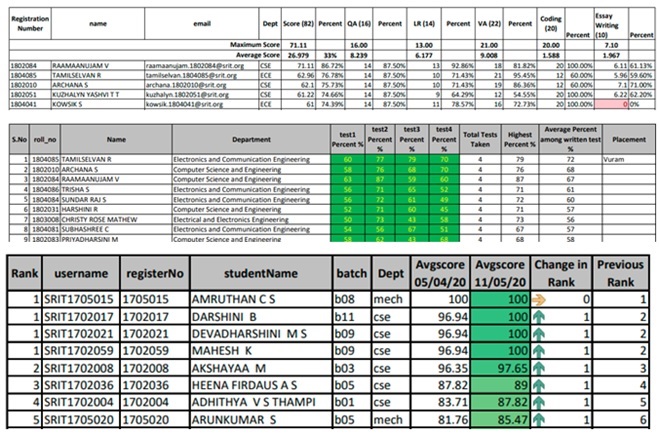
Starting from the academic year 2017, Sri Ramakrishna Institute of Technology offers one-credit courses and detailed 4-year Value added Skill Development programme plans for student batches.
- For each one-credit course, the course objective and course outcome is designed in collaboration with professionals so as to ensure that the course is market relevant.
- Internal assessments and tests are conducted for these one-credit courses to evaluate the students on their performance and assess their level of understanding.
- A continuous feedback system at the end of these courses is followed to ensure that student opinion is taken into consideration.
- Students have to take up compulsory industrial visits at least once every academic year to ensure their exposure to the industry.
- The 4-year Value added Skill Development Programmes will run in parallel with the regular academic curriculum and enriches the employability traits of the students as they progress towards their graduation.
- A template of such a plan for the 4-year Value added Skill Development Programme is described in the following section. This plan is refined over the years based on the experience gained in the execution of the plan and the outcomes achieved. The plan is common to the students irrespective of their stream of engineering degree programme.
Advantages
One-Credit Courses
- Credit Courses offered are globally and locally relevant.
- SRIT has successfully collaborated with several distinguished companies that provide value add on courses.
- Internship and Final Placement opportunities in renowned companies such as among many others.
Value added Skill Development programme
- To provide students an understanding of the expectations of industry.
- To improve employability skills of students.
- To bridge the skill gaps and make students industry ready.
- To provide an opportunity to students to develop inter-disciplinary skills.
Challenging issues
Designing courses that cater to the interests of a diverse set of students who come from various backgrounds and cultures.
Evidence of Success
The value-added skill development programmes improved the employability traits of the students. The evidence in terms of Placement conversion rates is blurred due to the pandemic situation prevailed in the country during the academic years 2020-2021 and 2021-2022. We could able to sustain the momentum of placements and prevent a sheer drop. The improvement in quality and quantity of placement is visible in the following charts.
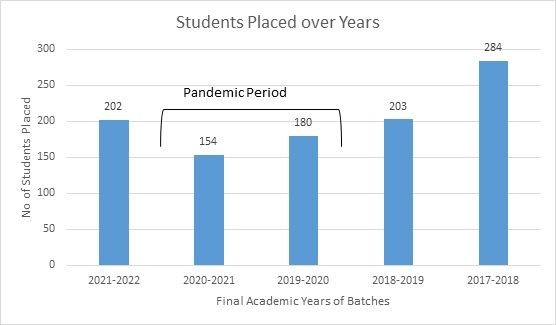
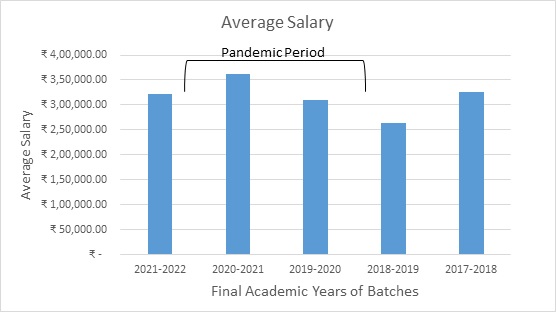
Since these credits are compulsory, all students have to complete the course in order to graduate. Students have further built their CV and secured jobs.
Problems Encountered/ Resources Required:
Pandemic scenario which prevailed around the world during the outcome phase of the implementation prevented us from measuring the actual benefits of the scheme. This is a temporary setback and still the average salary offered is improved much to the delight of students.
The scheme requires ample support from Industry in terms of resource persons and interactions. The collaboration with Industry in this regard is constantly pursued to achieve desired results.
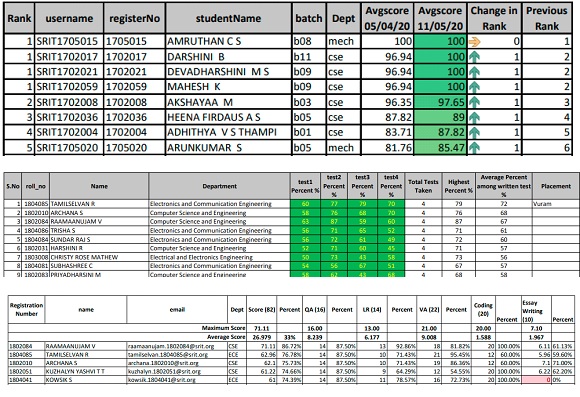
International and National Level Student Internship - Continuous Professional Development
In the contemporary business world, career life has become highly competitive, as many people have acquired degrees. However, to survive the competitive business world, skills and especially experience is needed to grow the career of an individual. As Graduates are becoming many, the need for practical experience through a formal program for beginners in a profession is necessary. In this regard, internships help integrate class theory and knowledge with practical applications towards a professional as well as personal growth. Therefore, several reasons have been accrued to the need for internships for students in the world today. The institute also encourges the students to undergo Internships in International Universities SRIT has signed International MoU's with Universiti Malaysia Perlis ( UNIMAP ), Ariel University, Israel which has enabled our students to gain global technical exposure. Since 2018, our students have completed interships in the International Universities.
Objectives
- To enable students to gain experience in the industrial environment.
- To equip a student with some experience in operating in the real world.
- To provide involved students with soft skills, which may turn out to be more useful than technical skills
- To provide students with an opportunity to network
The Context
Internships are foundational in preparing students for the workforce and providing opportunities after graduation. Most employers seek career-ready college graduates who have been equipped with prior experiences and skills in a given field. Immersive internships in the field of study are essential to successful outcomes after graduation of a student. An internship is an amalgamation of theory and practice. Classroom environments involves the students with discussion, debate, peer interaction, and shared learning experiences but it’s important for the student to apply and develop the academic concepts in a professional setting. Internships also offer the benefit of creating professional recommendations, practical experience, and building networking opportunities.
The Practice
STANDARD OPERATING PROCEDURE FOR INTERNSHIP
- The department internship coordinator has to collect a list of 3 companies from their department faculty members along with their address and the maximum count of students that the company can take.
- The department internship coordinator has to consolidate the list of companies that has been collected from their faculty members.
- This company list has to be vetted by the panel constituted in the department by taking into consideration, the genuineness of the company.
- The vetted company list has to present to the institutional academic committee.
- After approval from the institutional academic committee, the students can submit the application form and the bonafide to the department internship coordinator, who in turn will submit the same to the institution’s internship coordinator.
- The institution internship coordinator will get the approval from the Principal in the bonafide and after approval, will return it back to the department internship coordinator.
- It is mandatory that the students should earn 1 credit by attending internship for a period of 14 days. However, the student can earn upto 2 credits by attending internship for a period of 28 days.
- Students attending internship outside the country, can earn 1 credit by attending internship for 7 days and can earn 2 credits by attending internship for 14 days.
- Depending upon the company, a maximum of 7 students can attend internship in a particular company.
- The department internship coordinator along with other faculty members from their department can do a random check by visiting the company to ensure that the student is attending the internship.
- After attending the internship, the student has to provide the original internship certificate to the department internship coordinator.
- The department internship coordinator has to check the genuineness of the certificate that has been submitted.
- The viva-voce has to be conducted during the specified date for the students who have submitted their internship reports as per the format given.
- The evaluation panel will award the marks after conducting the viva-voce.
BENEFITS OF INTERNSHIP
Benefits to the Industry
- Availability of ready to contribute candidates for employment.
- Year round source of highly motivated pre-professionals.
- Students bring new perspectives to problem solving.
- Visibility of the organization is increased on campus.
- Quality candidate’s availability for temporary or seasonal positions and projects.
- Freedom for industrial staff to pursue more creative projects.
- Availability of flexible, cost-effective work force not requiring a long-term employer commitment.
- Proven, cost-effective way to recruit and evaluate potential employees.
- Enhancement of employer’s image in the community by contributing to the educational enterprise.
Benefits to Students
- An opportunity to get hired by the Industry/ organization.
- Practical experience in an organizational setting.
- Excellent opportunity to see how the theoretical aspects learned in classes are integrated into the practical world. On-floor experience provides much more professional experience which is often worth more than classroom teaching.
- Helps them decide if the industry and the profession is the best career option to pursue.
- Opportunity to learn new skills and supplement knowledge.
- Opportunity to practice communication and teamwork skills.
- Opportunity to learn strategies like time management, multi-tasking etc in an industrial setup.
- Opportunity to meet new people and learn networking skills.
- Makes a valuable addition to their resume.
- Enhances their candidacy for higher education.
- Creating network and social circle and developing relationships with industry people.
- Provides opportunity to evaluate the organization before committing to a full time position.
Benefits to the Institute
- Build industrial relations.
- Makes the placement process easier.
- Improve institutional credibility & branding.
- Helps in retention of the students.
- Curriculum revision can be made based on feedback from Industry/ students.
- Improvement in teaching learning process.
Evidence of Success
Many students seize internship opportunities, as having an internship experience leads to full-time job prospects and higher pay. In addition, internships helps students to apply classroom learning in a professional setting. It also introduces them to the world of work and provides an opportunity to develop their careers. Students can grow their technical know-how and soft skills, which are both crucial to landing a job. Thus, an internship paves the way for a full-time position later. A Batch-wise report on the number of students who have completed their internships is provided below.
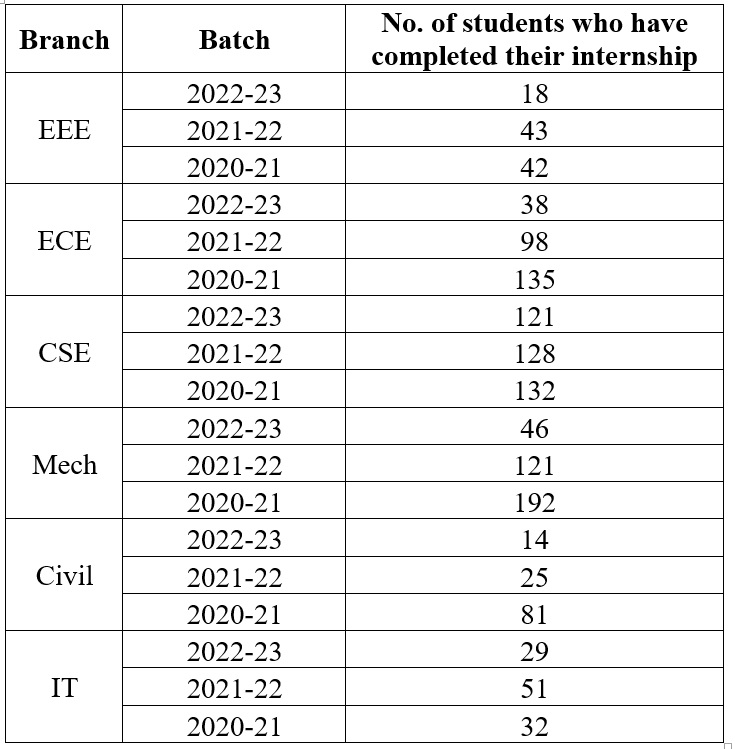
Problems Encountered and Resources Required
Problems Encountered
- Providing slots in the academic schedule to give training in regular time.
- Identifying the Core Industries that can provide training in the required slots.
- The college has provided the required resources by identifying many companies which enables the students to choose according to the slots in the academic schedule.
Resources Required
- Hardware and software required for online internships
- The college management provided the required resources and the problems are solved with the co-operation of faculty members and students by providing suitable slots and staying beyond the working hours, if required.